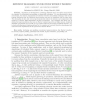Free Online Productivity Tools
i2Speak
i2Symbol
i2OCR
iTex2Img
iWeb2Print
iWeb2Shot
i2Type
iPdf2Split
iPdf2Merge
i2Bopomofo
i2Arabic
i2Style
i2Image
i2PDF
iLatex2Rtf
Sci2ools
CORR
2010
Springer
2010
Springer
Efficient Dealiased Convolutions without Padding
Algorithms are developed for calculating dealiased linear convolution sums without the expense of conventional zero-padding or phase-shift techniques. For one-dimensional in-place convolutions, the memory requirements are identical with the zero-padding technique, with the important distinction that the additional work memory need not be contiguous with the input data. This decoupling of data and work arrays dramatically reduces the memory and computation time required to evaluate higher-dimensional in-place convolutions. The technique also allows one to dealias the hyperconvolutions that arise on Fourier transforming cubic and higher powers. Implicitly dealiased convolutions can be built on top of state-of-the-art fast Fourier transform libraries: vectorized multidimensional implementations for the complex and centered Hermitian (pseudospectral) cases have been implemented in the open-source software fftw++. Key words. dealiasing, zero padding, convolution, hyperconvolution, fast Four...
CORR 2010 | Education | Fast Fourier | In-place Convolutions | One-dimensional In-place Convolutions |
| Added | 09 Dec 2010 |
| Updated | 09 Dec 2010 |
| Type | Journal |
| Year | 2010 |
| Where | CORR |
| Authors | John C. Bowman, Malcolm Roberts |
Comments (0)

